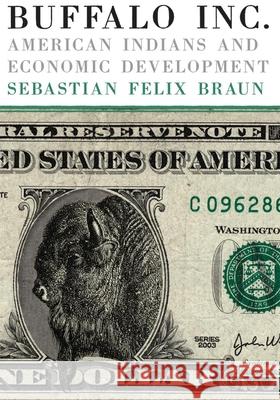Buffalo, Inc.: American Indians and Economic Development » książka
Buffalo, Inc.: American Indians and Economic Development
ISBN-13: 9780806143729 / Angielski / Miękka / 2013 / 284 str.
Buffalo as a business on the Cheyenne River Sioux Reservation Some American Indian tribes on the Great Plains have turned to bison ranching in recent years as a culturally and ecologically sustainable economic development program. This book focuses on one enterprise on the Cheyenne River Sioux Reservation to determine whether such projects have fulfilled expectations and how they fit with traditional and contemporary Lakota values. Drawing upon on-site fieldwork and using anthropological, economic, and ecological approaches, Sebastian Felix Braun examines the creation of Pte Hca Ka, Inc., and its management styles as they evolved over fifteen years. He paints a compelling picture of cultural change. Braun traces Pte Hca Ka from its origin as a self-sustaining project that sought to combine traditional values with modern technology. He shows how the company tried to operate on cultural and ecological ideals until the tribal government shed its cultural agenda in favor of a pure business orientation. Braun describes these changes and presents the arguments of both sides. In Buffalo Inc., bison serve as a test case for a broader analysis of issues such as sustainability, economic development, tribal politics, and cultural identity. Sebastian Felix Braun holds a Ph.D. in anthropology from Indiana University and is Assistant Professor in the Department of Indian Studies at the University of North Dakota, Grand Forks. "Explores issues of sustainability, economic development, sovereignty, ecology, health, representation of history, and the intersection of all of these complex concepts: place." -SciTech Book News
Buffalo as a business on the Cheyenne River Sioux Reservation Some American Indian tribes on the Great Plains have turned to bison ranching in recent years as a culturally and ecologically sustainable economic development program. This book focuses on one enterprise on the Cheyenne River Sioux Reservation to determine whether such projects have fulfilled expectations and how they fit with traditional and contemporary Lakota values. Drawing upon on-site fieldwork and using anthropological, economic, and ecological approaches, Sebastian Felix Braun examines the creation of Pte Hca Ka, Inc., and its management styles as they evolved over fifteen years. He paints a compelling picture of cultural change. Braun traces Pte Hca Ka from its origin as a self-sustaining project that sought to combine traditional values with modern technology. He shows how the company tried to operate on cultural and ecological ideals until the tribal government shed its cultural agenda in favor of a pure business orientation. Braun describes these changes and presents the arguments of both sides. In Buffalo Inc., bison serve as a test case for a broader analysis of issues such as sustainability, economic development, tribal politics, and cultural identity.Sebastian Felix Braun holds a Ph.D. in anthropology from Indiana University and is Assistant Professor in the Department of Indian Studies at the University of North Dakota, Grand Forks."Explores issues of sustainability, economic development, sovereignty, ecology, health, representation of history, and the intersection of all of these complex concepts: place." -SciTech Book News











